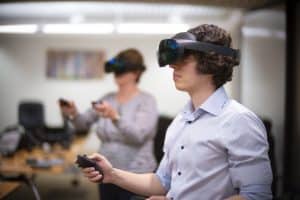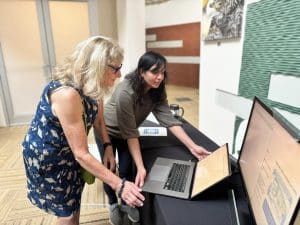Ocala Research Showcase highlights IHMC’s footprint and impact
Published 11.15.24
The Ocala community has long supported IHMC. But to many, the research that goes on there is a bit of a mystery.
Ocala’s campus is home to computer scientists, engineers, and linguists engaged in research spanning machine learning, natural language understanding, natural language understanding for social cybersecurity, and speech analysis for physiological state determination.
The inaugural Ocala Research Showcase was an open house-style event highlighting IHMC scientists and sharing the impact their research can have in artificial intelligence and machine learning, robotics and exoskeletons, and healthspan, resilience, and performance.

Research Scientist Dr. Ian Perera’s work at IHMC’s Ocala campus includes artificial intelligence, cognitive science and more.
Research Scientist Dr. Ian Perera led the coordination of the event along with Laurie Zink, development and community outreach director at the Ocala campus.
“(The showcase) created an opportunity to open up opportunities for collaboration with industry and researchers, engage with educators to help them better understand how to prepare their students for the rapid changes in technology their students will experience, and reach out to the public to show them the work we’re doing to augment their capabilities,” Perera said.
The hands-on demonstrations aimed to connect with different human capabilities – from physiological monitoring via eye tracking, to VR for identifying cognitive impairments from mild traumatic brain injury, to EEG for skill identification. Demos also included a memory augmentation app, work on enhancing the capabilities of Large Language Models, and identifying proficiency or potential talent for interacting with AI systems.
“Many visitors had never heard of IHMC and were amazed that we were engaged in such interesting work in their community,” Perera said. “Educators were very impressed with the potential of technology to provide more insight into the human condition.” Archna Bhatia received excited feedback from those who eagerly awaited the release of the memory augmentation app incorporating her research, with many saying they wanted to use it themselves or recommend it to family members.
Ocala hosts community outreach efforts including Evening Lectures, Science Saturdays and Summer Robotics Camp on campus. Laurie Zink, development and community outreach director in Ocala, said many showcase guests had never been to IHMC before and all left impressed.
“We gave out so much information on our education outreach opportunities and made and enhanced connections in the community that will be critical to our continued success,” Zink said. “We are looking forward to next year’s showcase already.”
Projects featured included:
- A cognitive assessment deployed in both virtual reality and an online platform, to aid in early detection of mild traumatic brain injury. These injuries can occur from sports impacts or near explosions or detonations in military situations and training and can have a significant impact on cognitive functioning — even without a clinically defined concussion happening.
- Hardware that allows eye tracking underwater to help track this crucial indicator for physiological state. In underwater situations, changes in an air mixture can rapidly affect an individual’s cognitive state, and early detection of this can save the lives of divers.
- Applying Large Language Models and Reinforcement Learning to teach LLMs to automatically learn to solve open-ended puzzle games, which is challenging at present for the models.
- A partnership with Army Research Laboratory to develop questionnaires and tasks that identify and stress the core cognitive skills needed to work with AI, which can often be opaque and unpredictable.
- A memory augmentation project focused on harnessing Natural Language Processing to help seniors with Alzheimer’s Disease and related dementias retrieve words in the course of daily life. The effort is being supported by funding from the Massachusetts AI and Technology Center, a member of the a2 Collective, which represents the Artificial Intelligence and Technology Collaboratories for Aging Research (AITC).
- A project using electroencephalography (EEG) to determine a person’s cognitive state (concentration, mood, fatigue, etc.), their reaction to stimuli, and their innate or learned skills in certain tasks.
- Work in the new Healthspan, Resilience, and Performance Research Center to better understand the factors that determine human health and abilities, and how we can build on that foundation toward optimizing the human experience.
IHMC is a not-for-profit research institute of the Florida University System where researchers pioneer science and technology aimed at leveraging and extending human capabilities. IHMC researchers and staff collaborate extensively with the government, industry and academia to help develop breakthrough technologies. IHMC research partners have included: DARPA, the National Science Foundation, NASA, Army, Navy, Air Force, National Institutes of Health, IBM, Microsoft, Honda, Boeing, Lockheed, and many others.
Latest News
- STEM-Talk: Pascal Lee on returning to the Moon — and heading to Mars
- Aging Symposium draws experts to IHMC
- IHMC hosts Fredric G. Levin Lung Care Symposium March 27-28 in Pensacola
- Humanoid robotics and exoskeletons lead latest IHMC newsletter
- Celebrate Robotics Week at IHMC Open House on April 11, 2025
- Registration open for 2025 Summer Robotics Camp
- STEM-Talk: JP Errico on vagus-nerve stimulation, inflammation and chronic disease management
- STEM-Talk: Karl Herrup on shortcomings of Alzheimer’s research
- Pensacola attorney joins IHMC Board of Directors


